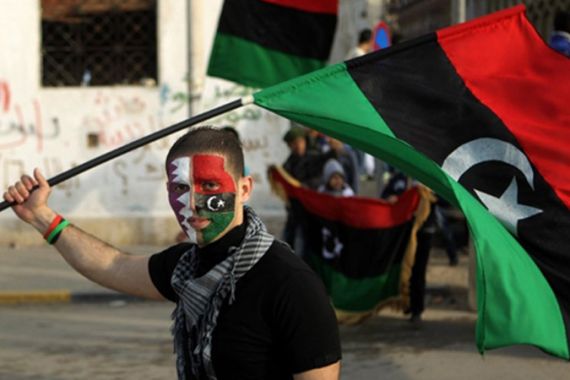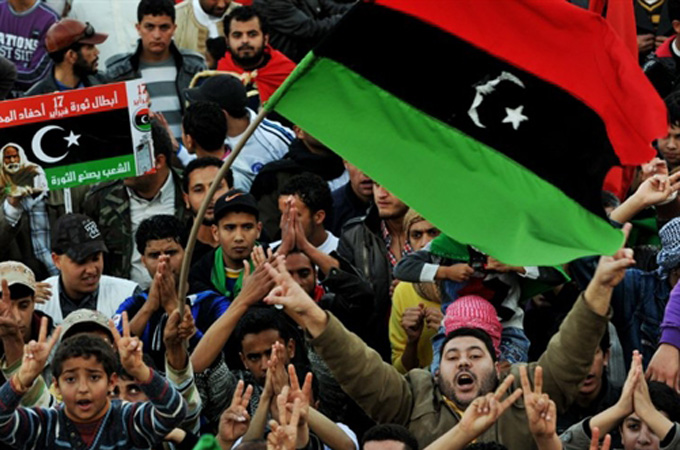Supporting the children of Omar Mukhtar
Western intervention in Libya marks a difficult moment in Arab history as empowerment is overwhelmed by helplessness.

 |
| Libyan anti-government protesters in Tobruk celebrate the UN approved no-fly zone [AFP] |
Muammar Gaddafi, the Libyan leader, must go. But it is critical that his downfall come at the hands of the Libyan people rather than as a result of Western military intervention in the country.
Western intervention in the country conjures up images of the destruction of Iraq and revives memories of the region’s colonial past. Furthermore, it tarnishes the spirit of the revolutions spreading across the Arab world, for these are aimed not only at removing dictators but at establishing free Arab governments. And free Arab governments cannot be imposed through Western interference.
No government is free if at its very inception it depends upon external powers – powers that, in the Libyan case, have their eye on the country’s oil wealth and are motivated by geopolitical interests.
It is true that Western military intervention in the country was brought about by Gaddafi’s murderous crackdown on his own people. But it is also the result of the Arab world’s failure to protect the people of the region from ruthless dictators and self-serving authoritarian rulers.
Furthermore, the bombing we have witnessed is a manifestation of the weakness of the UN – a body that has allowed the interests of major powers to define the nature and agenda of the current intervention.
The Libyan people needed and continue to need protection. But the current state of the UN permits countries like the US, France, Britain and Italy to cynically use “the mandate to protect” in order to preserve and expand their own interests.
The Iraqi example
Western intervention is seen by many in the region within the prism of the war in Iraq and its disastrous consequences. The state of Iraq – invaded, occupied, its state structure dismantled to give way to a predominantly sectarian system as its wealth is plundered by international oil companies and the ruling elite – is not a memory for the people of the Arab world but a daily reality.
Iraq and Afghanistan have shown that Western smart bombs wound and kill civilians – making the Libyan people vulnerable to fire power from both sides. But, while those killed by forces loyal to Gaddafi are seen as victims, those killed by Western bombs will at most be described as collateral damage – a necessary cost of war.
Furthermore there are no assurances that the West will respect Libya’s sovereignty once the regime has been overthrown – meaning that the Libyan people might rid the country of a dictator only to find themselves under foreign domination.
This is a region where the colonial past is not consigned to history textbooks, but where stories and songs about the suffering endured under colonialism and the heroic resistance to it exist as living parts of our culture.
The children of Omar Mukhtar
It is natural that Libyans and Arabs more broadly, should invoke the image of the Libyan revolutionary leader Omar Mukhtar when rising in protest. Mukhtar, who led the Libyan fight against colonialism, remains a potent symbol of the struggle for freedom.
And for the Libyans who are rising today against the tyranny of a leader, who has for 42 years silenced his enemies in the name of a self-styled claim to revolution, the struggle for a democratic government is an integral part of a broader struggle for freedom.
It is very distressing to watch the children of Omar Mukhtar squeezed between the brutality of a delusional dictator and the greed of Western governments. And it marks a disturbing and difficult moment in Arab history – Arabs are watching the Libyan people be massacred by a lunatic leader and grow increasingly reliant upon Western aid that could be a prelude to domination.
It is a situation that stirs conflicting feelings: The Arab revolutions have empowered people to believe in their ability to build a free future, but the Libyan struggle has underscored the limitations of people power when confronted by an unrestrained killing machine.
Unlike in Egypt, where state structures existed, Gaddafi had thrived by impeding the building of real state institutions – thus transforming Libya into his own real estate.
The success of the Egyptian and Tunisian revolutions should provide some support and a level of protection for the Libyan revolution. But both of these revolutions remain in danger as counter-revolutionary forces continue to resist the changes needed for free and accountable governments to be formed.
As for the rest of the Arab world, it is largely ruled by authoritarian rulers who are too busy trying to contain their own citizens’ revolutionary awakening to take steps, independently from the West, to support the Libyan people.
And past experiences have shown us that even when Arab countries participate in a Western intervention, as in Iraq, they end up merely being pawns or, at best, subordinate followers of a Western agenda.
In the two interventions currently taking place – in Bahrain and Libya – Western agendas dominate despite the apparent differences; the first intervention is in support of the government and the second supposedly in support of the people.
From empowerment to helplessness
This deep suspicion of Western motivations and goals is not simply a knee-jerk reaction to Western policies. Western inaction towards Israeli aggression is a strong reference point for Arab assessment that cannot be simply dismissed or ignored.
Western humanitarian interventions are often seen within the context of Western interests, which have largely contradicted the interests of the people of the region.
The US only supported the Tunisian and Egyptian uprisings when it became clear that the people were winning and it was time for the West to curry favour with the soon-to-be new rulers. Moreover, Western, but more specifically US, policies have since tried to shape the future governments of these two countries in a way that serves Western interests.
The people of the region are looking forward to independence from Western diktats and to the establishment of governments that are not heavily dependent on the West. The situation unfolding in Libya threatens these aspirations.
The danger posed to the Libyan people has opened the door to Western intervention and reinstated a sense of helplessness for the Arab people just when they had begun to feel empowered to take control of their own destiny.
For those in the region who support the intervention as a lesser of two evils, there is a conviction that there would be no limit to Gaddafi’s crimes. But it is difficult to get rid of the sense of foreboding that comes with Western intervention. Hope now rests upon the continued Arab revolutions and popular pressure on governments to place limits upon Western intervention. The voices of the people of the region must be heard to ensure that there will be no submission to Western domination.
Arabs must be prepared to support the children of Omar Mukhtar – not only in overthrowing a dictator but in ensuring they do not pay the price for Western intervention. Libya must not be turned into another failing state or succumb to a new form of colonialism. To ensure this, Arab revolutions elsewhere must continue and succeed.
Lamis Andoni is an analyst and commentator on Middle Eastern and Palestinian affairs.
The views expressed in this article are the author’s own and do not necessarily reflect Al Jazeera’s editorial policy.
